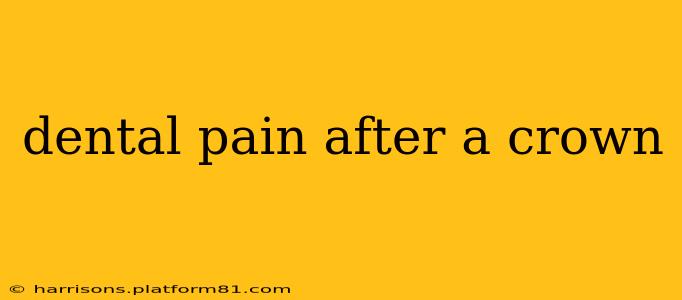Getting a dental crown is a common procedure designed to restore a damaged or decayed tooth. While crowns are generally successful, some patients experience dental pain afterward. This post explores the various reasons for post-crown dental pain, how to address it, and steps to prevent it in the first place.
Why Does My Tooth Hurt After Getting a Crown?
Post-crown pain is a relatively common occurrence, and thankfully, most cases are easily managed. However, understanding the potential causes is crucial.
1. Irritation from the Temporary Crown:
A temporary crown is often placed before the permanent one is fitted. This temporary crown might not fit perfectly, leading to irritation and subsequent pain. This is typically a minor issue and resolves once the permanent crown is cemented.
2. Sensitivity to Temperature or Pressure:
After a crown procedure, some sensitivity to hot or cold foods and drinks, or even pressure from biting, is expected. This usually subsides within a few days or weeks as the tooth and surrounding gums heal.
3. Cement Irritation:
The cement used to secure the crown can sometimes irritate the gum tissue, causing mild discomfort or inflammation. This irritation generally resolves on its own.
4. Pulpitis (Inflammation of the Pulp):
In some instances, the pain might indicate pulpitis, an inflammation of the tooth's inner soft tissue (the pulp). This can occur if the tooth was significantly damaged before the crown placement or if the procedure itself irritated the pulp. Pulpitis can range from mild sensitivity to severe throbbing pain.
5. Infection:
Bacterial infection under the crown is another possibility, although less common with proper procedure. Signs of infection include swelling, persistent throbbing pain, and possibly pus. This requires immediate professional attention.
6. Improper Crown Fit:
A poorly fitted crown can lead to discomfort and pain. The crown might be too high, causing the tooth to feel excessively tall, or it might not seal properly, allowing bacteria to enter and potentially cause infection.
7. Sinus Issues:
Pain in the upper molars after a crown could sometimes be related to sinus issues, not directly the crown itself. If you experience pain accompanied by other sinus symptoms, it's crucial to consult a doctor or ENT specialist.
How to Treat Post-Crown Dental Pain?
The treatment approach depends heavily on the underlying cause.
- Over-the-counter pain relievers: For mild pain and inflammation, ibuprofen or acetaminophen can provide relief.
- Saltwater rinse: A warm saltwater rinse can help clean the area, soothe irritated gums, and reduce inflammation.
- Gentle cleaning: Use a soft-bristled toothbrush and be gentle around the crowned tooth.
- Avoid irritants: Steer clear of extremely hot or cold foods and drinks, and avoid chewing on hard objects.
When Should You See a Dentist After Getting a Crown?
If your pain is severe, persistent (lasting more than a few days), accompanied by swelling, or you suspect an infection, seek immediate dental care. Don't delay—prompt treatment can prevent more serious complications.
How Can You Prevent Post-Crown Dental Pain?
Prevention is always better than cure. Choose a qualified and experienced dentist, ensure open communication about any pre-existing concerns, and meticulously follow your dentist's post-operative instructions.
This includes maintaining excellent oral hygiene, avoiding hard foods, and attending all follow-up appointments. Regular dental checkups are essential for maintaining overall oral health and addressing any potential issues early on.
By understanding the potential causes of post-crown pain and taking proactive steps, you can greatly improve your chances of a smooth and comfortable recovery. Remember, consulting your dentist is crucial for appropriate diagnosis and treatment.
